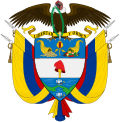| This article is part of a series on the |
| Politics of Colombia |
|---|
 |
Presidential elections were held in Colombia on 9 February 1930. [1] The result was a victory for Enrique Olaya Herrera of the Liberal Party, who received 44.9% of the vote. [2] He took office on 7 August. [3]
It was the first time since direct presidential elections were introduced in 1914 that a Conservative Party candidate had not won. [4] The Conservative Party was divided, splitting its vote between two conservative candidates. [5]
Enrique Olaya Herrera campaigned on Colombian industrialization, improvements in public education, improvements in public health. [5]